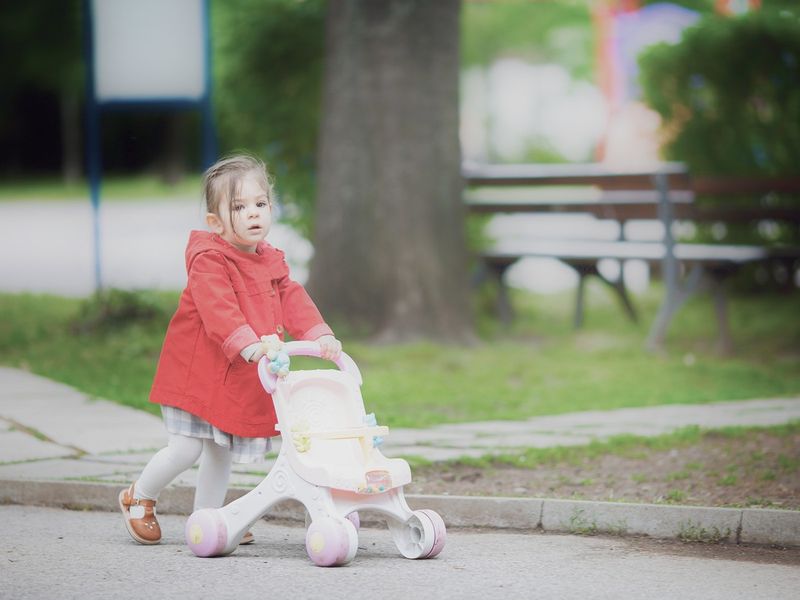Growing up too fast isn’t just a saying for some children. When kids are forced to take on adult roles and responsibilities before they’re ready, psychologists call it ‘parentification.’
This happens when children become caregivers for parents or siblings, handling emotional or practical burdens that should be managed by adults. The effects don’t simply disappear when you grow up—they often shape how you see yourself and relate to others throughout adulthood.
These are the signs to look out for.
1. Chronic Guilt or Responsibility for Others

The weight of everyone else’s problems sits heavily on your shoulders. You might catch yourself apologizing when a friend is having a bad day, even though you had nothing to do with it. This isn’t random—it’s a learned response from childhood when you believed family harmony depended on your efforts.
As a child caregiver, you likely internalized the message that others’ happiness was your job. Now as an adult, this translates to feeling responsible when anyone around you struggles. You rush to fix situations that aren’t yours to repair.
This constant sense of responsibility can be exhausting. Recognizing that other people’s emotions belong to them—not you—is the first step toward breaking this pattern and reclaiming your emotional freedom.
2. Emotional Suppression

Remember the last time you felt upset but pushed those feelings down? For parentified children, emotional suppression becomes second nature. You learned early that your feelings were less important than the family’s needs.
Being ‘the strong one’ meant there was no space for your own tears, anger, or fear. Parents relied on your stability, so you packed away emotions like unwanted clothes in a trunk. Years later, those suppressed feelings might emerge as numbness or sudden emotional flooding.
Many parentified adults struggle to name their emotions when asked how they feel. The path to healing involves giving yourself permission to experience the full range of emotions—even the messy ones—without judgment or the need to immediately regain control.
3. Anxiety or Hypervigilance

Your radar for trouble is always on high alert. Walking into a room, you immediately sense the mood and scan for potential problems—a skill developed when anticipating a parent’s needs or moods was crucial for family stability.
This constant state of readiness takes a physical toll. Your nervous system rarely gets the message that it’s safe to relax. Even during vacations or downtime, you might feel strangely unsettled, as if something important isn’t being handled.
Parentified children become adults whose bodies remember the cost of letting their guard down. Learning that you no longer need to monitor everyone’s emotional weather is a crucial step toward finding peace. Your hypervigilance was once protective, but now you can practice telling your nervous system: ‘We’re safe now.’
4. Low Self-Worth

The mirror reflects your face, but your mind sees only your usefulness to others. This distorted self-image stems from childhood experiences where love and acceptance seemed conditional on what you could provide—emotional support, childcare for siblings, or maintaining household stability.
Compliments about your character or appearance may slide off like water on glass. Yet praise for your helpfulness sticks because it confirms your primary value system: you matter when you’re useful. This belief creates a painful paradox where being needed feels simultaneously validating and exhausting.
Breaking free from this pattern means recognizing your inherent worth beyond what you do for others. Your value exists simply because you exist—a radical concept for those who grew up believing they had to earn their place in the family system.
5. Difficulty Knowing What You Want

The waiter asks what you’d like to order, and panic sets in. This seemingly simple question exposes a deeper struggle—you’ve spent so long attuned to others’ needs that your own preferences remain mysterious even to yourself.
As a parentified child, you learned to subordinate your desires to family necessities. Your developing sense of self took a backseat to crisis management and caregiving. Now as an adult, identifying personal preferences feels like navigating without a compass.
This uncertainty extends beyond restaurant menus to major life decisions. Career choices, relationships, and even leisure activities may be selected based on what seems practical or pleasing to others rather than what genuinely calls to you. Reconnecting with your authentic wants requires patience and permission to experiment without judgment.
6. People-Pleasing Tendencies

The word ‘no’ feels like a foreign language on your tongue. You find yourself agreeing to help colleagues, friends, and family even when you’re already overwhelmed. This isn’t just kindness—it’s a survival strategy carried from childhood.
When young caregivers learn that family harmony depends on their compliance, saying ‘yes’ becomes automatic. Your early experiences taught that prioritizing others’ needs above your own was the path to safety and connection. The fear of disappointing others runs deeper than simple social discomfort.
Adults with parentified childhoods often experience physical anxiety at the mere thought of setting boundaries. Learning that relationships can withstand your occasional refusal is revolutionary. True connection actually thrives when both parties can honestly express their limits without fear of abandonment.
7. Perfectionism

One small mistake feels like evidence of your fundamental unworthiness. This isn’t ordinary high standards—it’s the echo of a childhood where perfect performance meant keeping chaos at bay. When family stability rested on your small shoulders, failure wasn’t an option.
Parentified children often develop an unforgiving internal critic. Every error seems catastrophic because historically, your mistakes could have real consequences for vulnerable family members. The pressure to get everything right the first time becomes a prison of your own making.
Adult perfectionists with parentified backgrounds frequently report physical symptoms when they perceive they’ve fallen short—racing heart, tight chest, insomnia. Healing begins with recognizing that mistakes are universal human experiences, not character indictments. Your worth never depended on perfect performance, even when circumstances suggested otherwise.
8. Overdeveloped Sense of Control

The need to manage every detail isn’t just preference—it’s emotional survival. Growing up in unpredictable environments where adults were unreliable taught you that control equals safety. When nobody else was steering the family ship, you grabbed the wheel.
This hypercontrol might show up in meticulous planning, difficulty delegating, or anxiety when plans change unexpectedly. Behind the organized exterior often lies fear: if you loosen your grip, everything might fall apart again. Friends and partners may experience your control needs as rigidity without understanding its protective origins.
Learning to distinguish between healthy influence and impossible control is crucial for recovery. Not everything needs your management, and discovering which things truly require your attention frees enormous energy for joy and creativity that control-focused living consumes.
9. Caretaker in Adult Relationships

Your friends call you their rock. Partners lean heavily on your emotional support. While being helpful seems positive, you’ve noticed a pattern—you’re always the giver, rarely the receiver.
This caretaking role feels familiar because it echoes your childhood position. As a parentified child, you became skilled at anticipating needs and providing comfort to parents or siblings. Now these patterns replay in adult connections, creating unbalanced relationships where your needs remain secondary.
You might find yourself drawn to people with obvious struggles, unconsciously recreating dynamics where your value comes from helping others through crises. Breaking this cycle requires conscious effort to seek relationships with equal give-and-take. True intimacy involves mutual care, not one-sided support that leaves you emotionally depleted.
10. Fear of Being a Burden

The thought of asking for help makes your stomach clench. Even when struggling, you present a capable face to the world. This isn’t pride—it’s the legacy of a childhood where your needs often went unaddressed.
Parentified children learn early that their problems overload already-struggling parents. You became the family resource rather than its beneficiary. This role reversal creates deep discomfort with receiving support that persists into adulthood.
Many adults with parentification histories describe physical discomfort when others offer help—racing heart, flushed face, or an urgent need to decline assistance. Healing involves recognizing that interdependence differs from the unhealthy dependence you witnessed or feared as a child. Your needs matter, and expressing them doesn’t make you a burden—it makes you human.
11. Struggles with Intimacy

Getting close to others feels like walking on thin ice. You maintain careful distance—not because you don’t want connection, but because true intimacy requires vulnerability you never learned was safe. Your childhood role as family caregiver taught you to focus outward, not inward.
The parentified child becomes an adult who struggles to share their authentic self. You might reveal surface-level information while guarding deeper truths, fears, and needs. This protective pattern creates a paradox: people describe you as supportive and present, yet few truly know your inner world.
Romantic relationships often trigger these intimacy challenges most intensely. The closer someone gets, the stronger your urge to retreat or redirect attention to their needs instead. Building genuine intimacy requires practicing emotional exposure in small, safe steps with trustworthy people.
12. Enmeshment or Codependency

The line between where you end and others begin seems blurry at best. Their moods become your moods. Their problems feel like emergencies requiring your immediate attention. This boundary confusion isn’t random—it reflects early training in emotional fusion.
Parentified children develop hypersensitivity to others’ emotional states out of necessity. When a parent’s wellbeing determined family stability, tracking their feelings became survival. Now as an adult, this enmeshment continues in relationships where your identity remains partially merged with loved ones.
You might notice physical symptoms mirroring someone else’s distress or find yourself unable to function when a loved one struggles. Breaking free from codependency involves the challenging work of emotional differentiation—learning that empathy doesn’t require absorbing others’ emotions as your own. Your separate selfhood is not selfish but necessary.
13. Burnout and Overfunctioning

The breaking point arrives without warning. After years of taking on extra responsibilities at work, managing family logistics, and being everyone’s emergency contact, your body and mind finally revolt. This collapse isn’t weakness—it’s the inevitable result of chronic overfunctioning.
Parentified children become adults who automatically step in when systems falter. You notice gaps others miss and fill them without being asked. While colleagues marvel at your capacity, they don’t see the private toll: exhaustion, resentment, and a growing sense of invisibility.
Recovery from burnout requires more than rest—it demands dismantling core beliefs about your responsibility to hold everything together. The world won’t collapse if you step back. Learning to delegate and decline unnecessary burdens isn’t selfish—it’s sustainable self-preservation that allows you to contribute meaningfully without self-destruction.
14. Avoidance of Conflict

The slightest hint of disagreement sends your heart racing. You find yourself agreeing with contradictory opinions or changing subjects when tensions rise. This peace-at-all-costs approach stems from childhood experiences where conflict meant danger.
In families requiring parentification, arguments often preceded crisis. Children in caretaking roles learned that keeping everyone happy prevented emotional or physical fallout. Your conflict avoidance isn’t cowardice—it was once essential protection.
As an adult, this pattern prevents authentic communication. Unaddressed issues accumulate beneath polite exteriors. Learning that healthy disagreement strengthens rather than destroys relationships represents a fundamental shift in understanding. Conflict skills can be developed even decades after the childhood experiences that made confrontation feel unsafe.
15. Delayed or Lost Adolescence

Sometimes you find yourself drawn to activities others your age outgrew years ago. This isn’t immaturity—it’s your psyche reclaiming experiences that parentification stole. When childhood responsibilities arrived too early, normal developmental stages got postponed.
The serious child who managed household budgets or provided emotional support to parents couldn’t fully engage in age-appropriate exploration and play. Parts of your development went on hold while you handled adult concerns. Now these delayed developmental needs may emerge unexpectedly in adulthood.
Many parentified adults report feeling ‘behind’ peers in certain life skills while being paradoxically advanced in others. This uneven development makes perfect sense given your history. Giving yourself permission to explore missed experiences—from silly fun to identity experimentation—isn’t regression but necessary completion of interrupted growth.
16. Difficulty Receiving Care

When someone offers genuine nurturing, you feel oddly uncomfortable—maybe even suspicious of their motives. This reaction puzzles friends who see only your giving nature, not understanding that receiving care feels like speaking a language you barely learned.
Parentified children experience role reversal that disrupts normal caregiving patterns. Instead of consistently receiving nurturing, you provided it to others. This reversal creates a nurturing deficit that persists into adulthood, making normal care feel unfamiliar or even threatening.
You might notice physical discomfort when someone tends to your needs—fidgeting, changing the subject, or an urge to reciprocate immediately. Healing involves gradually increasing your tolerance for receiving without immediately giving back. Your nervous system needs time to recognize that being cared for is both safe and deserved.


Comments
Loading…